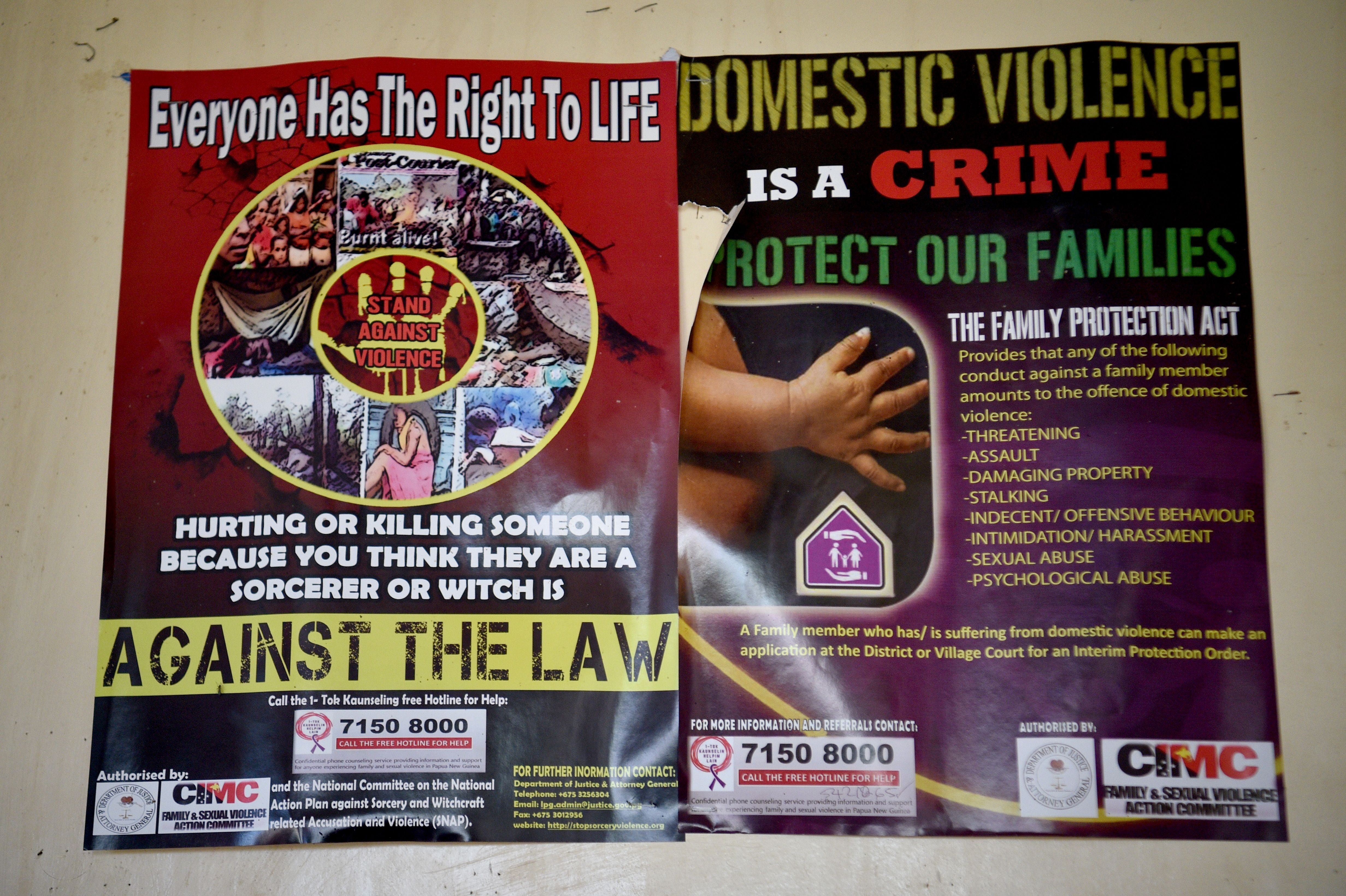Rising numbers of women in Papua New Guinea attacked after being accused of ‘witchcraft’
One woman was tied up and burned alive after being accused of sorcery

Posters warning against violence at a police station in Wabag, Papua New Guinea
A rising number of women in Papua New Guinea have suffered brutal violence after being falsely accused of carrying out witchcraft, campaigners have warned.
Human Rights Watch noted that accusations over sorcery often surface when there has been a sudden death or illness in the community, and said that the increase in attacks could be linked to a steep rise in coronavirus cases in the southwestern Pacific country.
The organisation called for the authorities to take measures to urgently stop disinformation about Covid-19 deaths in a bid to prevent more attacks being carried out in relation to allegations of sorcery.
Human Rights Watch said at least five women have been attacked since March this year – with one of them being killed.
The most recent reported case, in early May, was of Mary Kopari, who was accused of sorcery after a young boy died in her village. She was tied up and burned alive in Komo-Magarima District – with the attack filmed and reported by Papua New Guinea television.
Human Rights Watch said that while police are aware of the identities of some of the attackers, no arrests have been reported.
Violence in relation to allegations of sorcery is prevalent in the country, and takes place in the context of high levels of gender-based violence. Women are the victims in the majority of incidents of violence following accusations of witchcraft, but men have been attacked in the past too.
Stephanie McLennan, senior manager of Asia initiatives at Human Rights Watch, said: “The Papua New Guinea government should urgently investigate all cases of violence following sorcery accusations, and prosecute those responsible.
“Gender-based violence is a persistent problem in Papua New Guinea, and the government is doing very little to stop it.”
Ms McLennan called for the government to tackle the “root causes of sorcery accusations” such as the dearth of “basic knowledge among the public about health problems”.
She added: “The authorities should act swiftly and effectively to correct misinformation about deaths from Covid-19 to prevent more sorcery accusations and attacks.”
In one case, a 45-year-old woman and her 19-year-old daughter were accused of causing the woman’s husband to have died. He is believed to have died from Covid.
The mother and daughter were held captive by the husband’s relatives and tortured with hot iron rods in Goroka, capital of the Eastern Highlands province, at the end of March. Police managed to rescue both of them from the attack.
Police also rescued two women in April who were viciously attacked in Port Moresby by a group of up to 20 men, who tortured them after accusing them of witchcraft.
The women were scalded with hot irons for hours after men accused them of carrying out sorcery and of killing a woman who had recently died. Police discovered one of the women tied up with ropes and severely injured. Both women were treated for knife injuries as well as serious burns.
A coalition of members of parliament is currently holding a meeting about gender-based violence in the country – with the inquiry stretching from the end of May until the end of June.
Dr Fiona Hukula, a gender specialist who gave evidence at one of the summit’s hearings, said that women accused of sorcery are “often tortured, often cut, sexually violated, their clothes are removed and they are often kept in captivity”.
Ms McLennan, of Human Rights Watch, added: “Papua New Guinea’s leaders should order the police to take gender-based violence seriously, provide sufficient resources for officials to prosecute these crimes, and provide all survivors with medical treatment, shelter, and access to support services.
“The parliamentary inquiry should lead the way in exploring options for early warning, protection, and dispute resolution mechanisms that can help prevent such crimes.”
Subscribe to Independent Premium to bookmark this article
Want to bookmark your favourite articles and stories to read or reference later? Start your Independent Premium subscription today.

Join our commenting forum
Join thought-provoking conversations, follow other Independent readers and see their replies